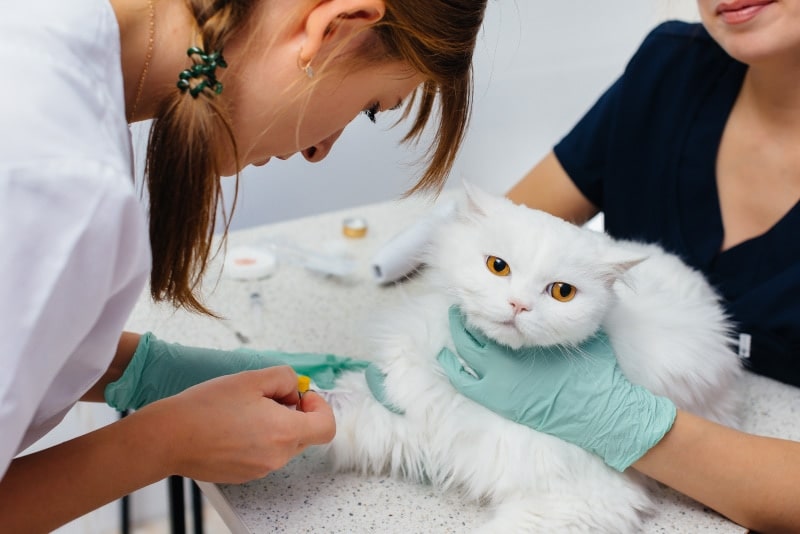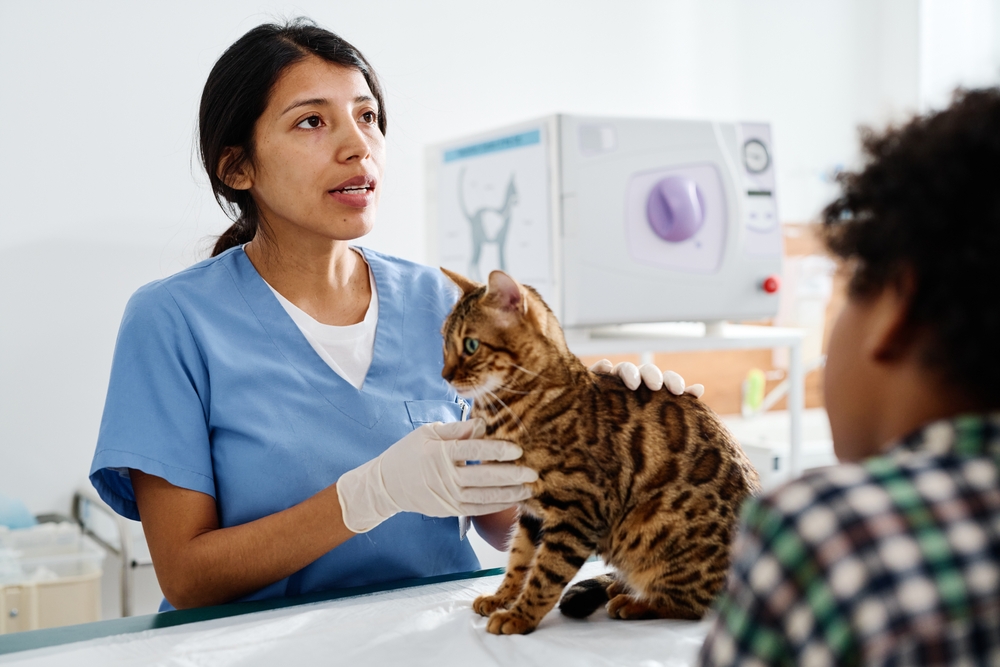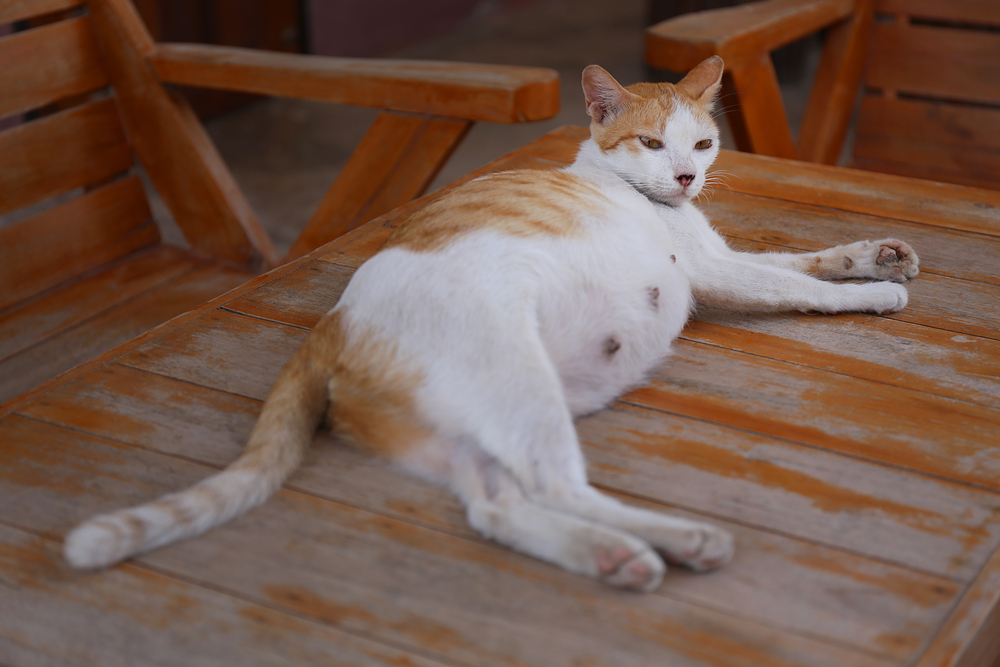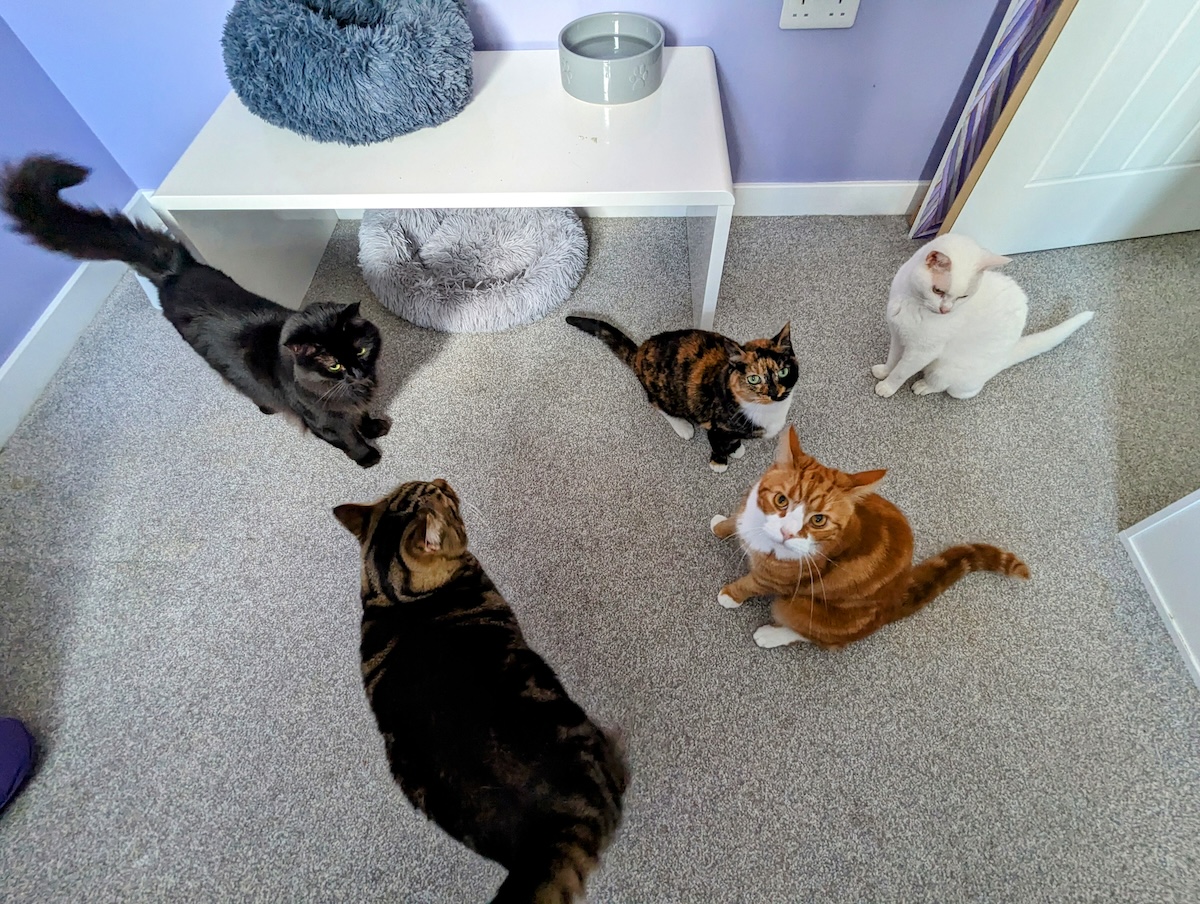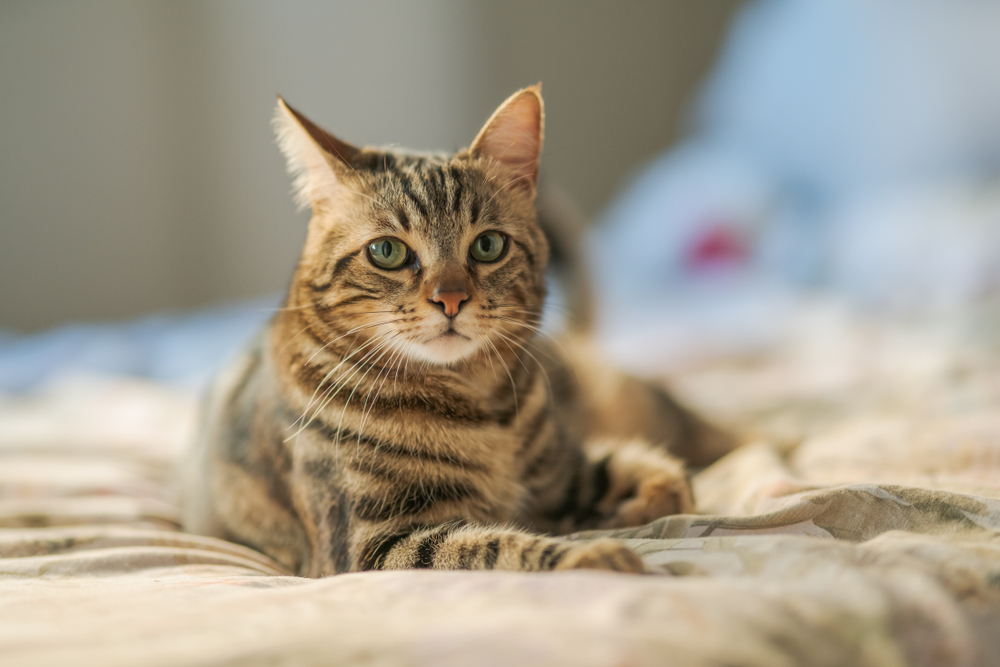Addison’s Disease, also known as hypoadrenocorticism, occurs due to a deficiency in adrenal gland hormones. It is a rare condition in cats. The underlying cause is not yet fully understood; however, it is thought to be related to an autoimmune disorder where the cat’s body destroys some of its tissue. Destruction of the adrenal gland can also occur through things like cancer or injury to the gland.
When the adrenal gland isn’t functioning as well as it should be, there are reduced amounts of certain hormones circulating in the body. This causes electrolyte imbalances of potassium, chloride, and sodium. In the case of Addison’s Disease, potassium is allowed to gradually build up in the blood and can eventually cause the heart to slow down or beat irregularly.
If left untreated, it can progress to kidney failure and shock. Clinical signs, blood tests, and diagnostic imaging can be used to diagnose Addison’s Disease.
What Is Addison’s Disease in Cats?
Addison’s disease is rare in cats. It is a disease that affects two important glands in the body called the adrenal glands. The adrenal glands are located in front of the kidneys. These glands are responsible for the production of important hormones such as cortisol, aldosterone, progesterone, estrogen, and androgens. These hormones are vital to the normal healthy functioning of the cat’s body. They help regulate your cat’s metabolism, blood pressure, immune system, and their response to stress amongst other things.
Without them, your cat will become very sick. The adrenal glands are paired glands that are made up of an outer cortex and inner medulla.
Important Functions of Hormones
- Aldosterone: This hormone regulates the body’s levels of minerals potassium and sodium. They both play vital roles in maintaining the body’s fluid levels.
- Cortisol: This is a stress hormone. It affects many important things including the regulation of glucose, protein, and fat metabolism and the healthy running of the immune system.
- Sex Hormones: The adrenals produce important hormones including androgens, estrogen, and progesterone. These all play instrumental roles in sexual activity and fertility.
What Are the Signs of Addison’s Disease in Cats?
Addison’s Disease is notoriously difficult to diagnose. This is because the clinical signs tend to be vague and non-specific. They often mimic other diseases. The symptoms can also be intermittent.
Common signs include 1:
- Weight loss
- Reduced appetite
- Lethargy
- General weakness
- Increased thirst
- Increased urination
- Dehydration
- Vomiting
- Diarrhea
- Low body temperature
- Low blood pressure
- Slow heart rate
- Faster breathing rate
- Pale gums
Cats can also experience something called an adrenal crisis 2. This is a medical emergency and if your cat does not receive prompt treatment, they may die. Aggression fluid therapy is required to correct dehydration and restore levels of body fluids and electrolytes. Hormone replacement therapy is initiated when the cat has been stabilized.
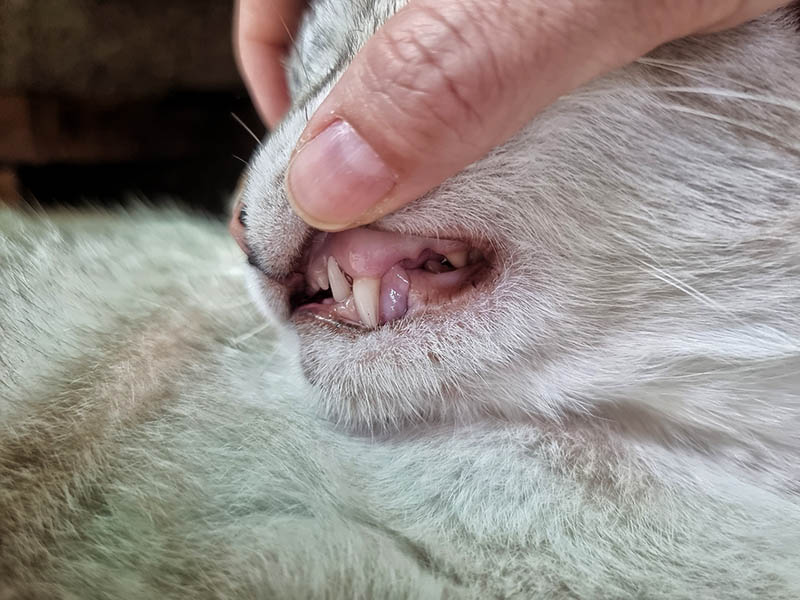
What Are the Causes of Addison’s Disease in Cats?
Addison’s Disease is caused by a deficiency of the hormones produced by the adrenal glands. The exact reason the adrenal glands stop production of these hormones is not very well understood. There are some diseases linked to the condition. In a lot of cases, it is believed that the immune system turns on itself and begins to attack the body’s own cells, including the cells of the adrenal gland. This is known as an immune-mediated disorder.
Some other diseases such as infections or cancer can cause damage or destruction of the adrenal glands. Physical injury to the adrenal glands causing damage can also lead to Addison’s Disease developing in some cases.
Diagnosis of a Cat with Addison’s Disease
As mentioned above, Addison’s Disease can be tricky to diagnose. Presenting clinical signs does not necessarily lead to Addison’s Disease as they can mean many different things.
If your cat is showing any of the clinical signs listed above, it is recommended that you take your cat to your vet so that they can examine your cat and run the necessary tests.
Your vet will begin by examining your cat from head to tail and noting any abnormalities present. They will run some routine blood tests to assess blood cell counts and organ function. They will carry out a urinalysis to check kidney function and also to see if the urine is being concentrated properly. They will check your cat’s blood pressure too. X-rays of the chest and an ECG may also be advised. Some vets will do an ultrasound on the abdomen as well to assess the anatomy and check it is normal.
There are a few telltale signs your vet will be looking for on these tests. One of the most common ones is an electrolyte imbalance involving potassium and sodium.
If your vet suspects Addison’s Disease, there are a few further blood tests they can carry out to diagnose the condition. One of these is the ACTH stimulation test 3. This assesses adrenal function. Two measurements of cortical are taken. One is the baseline and the next one is a measurement taken after some synthetic adrenocorticotropic hormone has been given to the cat. In Addison’s Disease, there will be little or no increase in cortisol.
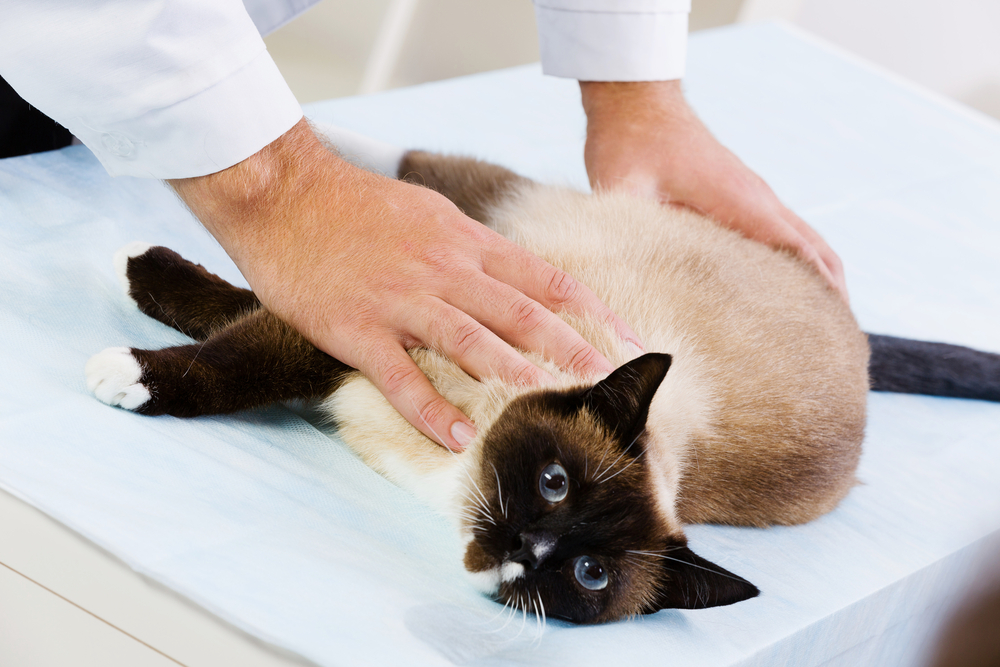
How Do I Care for a Cat with Addison’s Disease
There is no cure for Addison’s Disease, however, there are some effective treatment options that can help your cat live a good quality of life despite having the disease. If the cat presents in an Addisonian crisis, treatment from your vet will be geared around stabilizing your cat. Your vet will administer intravenous fluid therapy where required. Electrolyte imbalances will need to be corrected and hydration status brought back to normal. Blood transfusions are sometimes required too.
Once your cat is stable, long-term treatment can be initiated 4. This can be in the form of oral tablets or injections. Your cat will start on steroid replacement therapy. Cats are usually given two types of medication—one supplements glucocorticoids and the other supplements mineralocorticoids. Often cats are given prednisolone and an injectable mineralocorticoid. Both of these medications are now required for the duration of the cat’s life. They can be given at home usually or your vet can do the injections. Your cat will be monitored regularly by your vet to assess their response to the treatment and adjustments will be made based on how well they are responding.
Owners of cats with Addison’s Disease need to be aware that stress can cause an adrenal crisis. Owners must be mindful of this if their cat is in a potentially stressful situation such as moving house or the introduction of a new family member. It is important to never stop the medication abruptly as this can cause huge problems for your cat as they will have been relying on the medication to survive.
Frequently Asked Questions
How do cats get Addison’s Disease?
It is currently unclear exactly how cats develop Addison’s Disease, although there are a few predisposing factors that seem to be relevant. Cancer of the kidneys and the presence of tumors can contribute. Any damage or trauma to the adrenal glands can also predispose cats. Some cats are thought to develop it via an autoimmune disease, where the cat’s body starts to attack its cells.
What is the life expectancy of a cat with Addison’s disease?
If the disease is diagnosed promptly and treatment is started quickly, the prognosis is relatively good for cats. If cats are started on long-term therapy and owner compliance is good, the life expectancy is fair as long as there are no concurrent diseases that would have an adverse effect. Cats with an adrenal tumor present tend to have a worse prognosis; however, these cases are very rare.
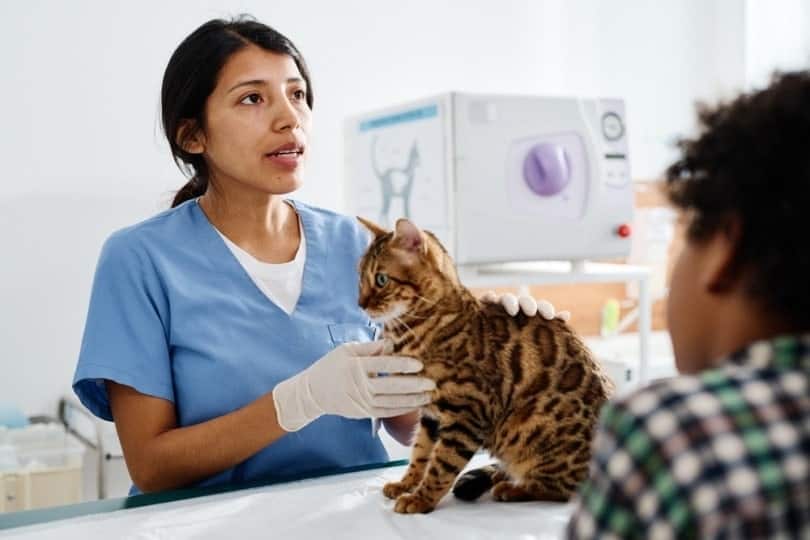
Does Addison’s disease get worse over time?
Unfortunately, Addison’s Disease is a progressive disorder. If left untreated, cats will slowly get worse, showing more symptoms until they die.
Can I prevent my cat from getting Addison’s Disease?
Since Addison’s Disease is usually caused by an autoimmune response, there is no sure way to prevent your cat from getting the disease. You can ensure your cat leads a healthy lifestyle and attends your vet regularly for checkups. If you do this it is likely that if they did start to develop Addison’s Disease, it would be caught early. Once receiving treatment, your cat will go back to leading a normal life.
Conclusion
Addison’s Disease is a rare disorder in cats that affects the adrenal glands. Unfortunately, there is no cure for it, but there are effective treatment methods that can be used with very good results in cats.
Signs can be very difficult to spot as they can be intermittent and non-specific. If you think your cat may be unwell at all, seek out help from your vet as soon as possible. Your vet will be able to carry out appropriate tests based on the clinical history and physical exam findings.
Once a diagnosis has been made, your vet will be able to start treatment for your cat. Once they are receiving the correct doses of medication, your cat will be able to return to a normal lifestyle.
Featured Image Credit: Andrii Medvednikov, Shutterstock

